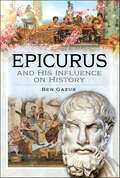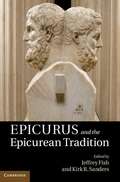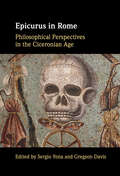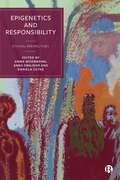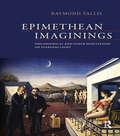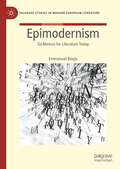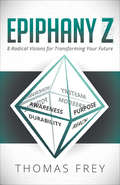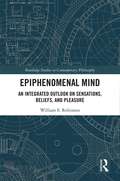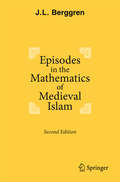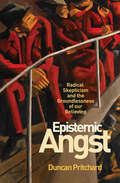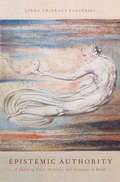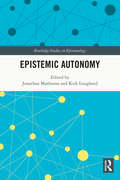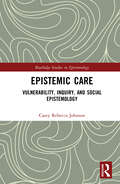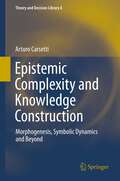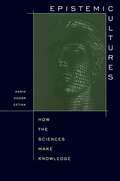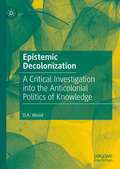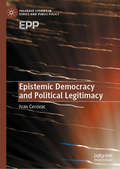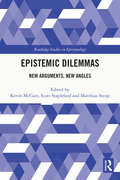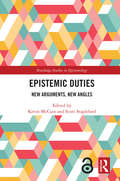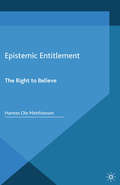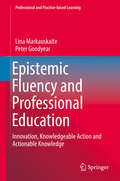- Table View
- List View
Epicureans and Atheists in France, 1650–1729
by Alan Charles KorsAtheism was the most foundational challenge to early-modern French certainties. Theologians and philosophers labelled such atheism as absurd, confident that neither the fact nor behaviour of nature was explicable without reference to God. The alternative was a categorical naturalism, whose most extreme form was Epicureanism. The dynamics of the Christian learned world, however, which this book explains, allowed the wide dissemination of the Epicurean argument. By the end of the seventeenth century, atheism achieved real voice and life. This book examines the Epicurean inheritance and explains what constituted actual atheistic thinking in early-modern France, distinguishing such categorical unbelief from other challenges to orthodox beliefs. Without understanding the actual context and convergence of the inheritance, scholarship, protocols, and polemical modes of orthodox culture, the early-modern generation and dissemination of atheism are inexplicable. This book brings to life both early-modern French Christian learned culture and the atheists who emerged from its intellectual vitality.
Epicurus and His Influence on History
by Ben GazurHow should we live? In ancient Greece one man came up with a pleasingly simple answer to this question. The philosopher Epicurus taught his followers that pleasure and contentment were the aims of the good life. For hundreds of years Epicureanism was one of the dominant schools of philosophy. But by the 6th century it had all but disappeared. Discovering how and why Epicureanism was driven from philosophy and public discourse reveals much about how Western thought developed. Despite attempts to erase him, the lessons of Epicurus have been recovered from the mists of time and the ashes of Vesuvius. How he was restored to his place in history is a story of brilliant Renaissance scholars, chance discoveries, and a hunger for intellectual freedom. This new biography of Epicurus reveals the life of Epicurus and traces how his teachings have influenced thinkers across time. Epicurus still has much to teach us about friendship, happiness, and our place in the world.
Epicurus and the Epicurean Tradition
by Kirk R. Sanders Jeffrey FishEpicureanism after the generation of its founders has been characterised as dogmatic, uncreative and static. But this volume brings together work from leading classicists and philosophers that demonstrates the persistent interplay in the school between historical and contemporary influences from outside the school and a commitment to the founders' authority. The interplay begins with Epicurus himself, who made arresting claims of intellectual independence, yet also admitted to taking over important ideas from predecessors, and displayed more receptivity than is usually thought to those of his contemporaries. The same principles of autonomy and openness figure importantly in the three major areas of focus in these essays: theology, politics and the emotions.
Epicurus in Rome: Philosophical Perspectives in the Ciceronian Age
by Gregson Davis Sergio YonaThe role of Greek thought in the final days of the Roman republic is a topic that has garnered much attention in recent years. This volume of essays, commissioned specially from a distinguished international group of scholars, explores the role and influence of Greek philosophy, specifically Epicureanism, in the late republic. It focuses primarily (although not exclusively) on the works and views of Cicero, premier politician and Roman philosopher of the day, and Lucretius, foremost among the representatives and supporters of Epicureanism at the time. Throughout the volume, the impact of such disparate reception on the part of these leading authors is explored in a way that illuminates the popularity as well as the controversy attached to the followers of Epicurus in Italy, ranging from ethical and political concerns to the understanding of scientific and celestial phenomena.
Epicurus in Rome: Philosophical Perspectives in the Ciceronian Age
by Gregson Davis Sergio YonaThe role of Greek thought in the final days of the Roman republic is a topic that has garnered much attention in recent years. This volume of essays, commissioned specially from a distinguished international group of scholars, explores the role and influence of Greek philosophy, specifically Epicureanism, in the late republic. It focuses primarily (although not exclusively) on the works and views of Cicero, premier politician and Roman philosopher of the day, and Lucretius, foremost among the representatives and supporters of Epicureanism at the time. Throughout the volume, the impact of such disparate reception on the part of these leading authors is explored in a way that illuminates the popularity as well as the controversy attached to the followers of Epicurus in Italy, ranging from ethical and political concerns to the understanding of scientific and celestial phenomena. This title is also available as Open Access on Cambridge Core.
Epigenetics and Responsibility: Ethical Perspectives
by Emma Moormann, Anna Smajdor and Daniela CutasEPUB and EPDF available Open Access under CC-BY-NC-ND licence. We tend to hold people responsible for their choices, but not for what they can’t control: their nature, genes or biological makeup. This thought-provoking collection redefines the boundaries of moral responsibility. It shows how epigenetics reveals connections between our genetic make-up and our environment. The essays challenge established notions of human nature and the nature/nurture divide and suggest a shift in focus from individual to collective responsibility. Uncovering the links between our genetic makeup, environment and experiences, this is an important contribution to ongoing debates on ethics, genetics and responsibility.
Epimethean Imaginings: Philosophical and Other Meditations on Everyday Light
by Raymond TallisThese essays, written in the spirit of Goethe’s Epimetheus who "traces the quick deed to the dim realm of form-combining possibilities", display the depth and breadth of Tallis’s fascination with our lives. Whether discussing philosophical "hardy perennials" like time, or a mundane artefact like ink, Tallis challenges us to think differently about who we are and why we are. The first part of the book – Analysis – dives into the deep-end to explore some of the big questions in philosophy: perception, knowledge and belief; time; the relationship between mathematics and reality; and probability and causation. The middle section – Tetchy Interludes – takes a wry look at some aspects of contemporary art; stupidity (including the author’s own); and Christmas. The third part – Celebration – is more experimental in both its subject matter and treatment. It celebrates the complexity of ordinary, everyday consciousness by contemplating the miracle of speech, artefacts that have transformed our lives (and what they reveal about our cognition) such as the wheel, the sail, and ink; and ‘snapshots’ of the author’s own consciousness on an ordinary day, of past consciousness, as captured in historical memory. Notwithstanding their diversity in theme and style, these essays share the common aim of discovering and celebrating the submerged riches in the "quick deeds" of our everyday lives and perceptions.
Epimodernism: Six Memos for Literature Today (Palgrave Studies in Modern European Literature)
by Emmanuel BoujuPostmodernism has had its day. Are we now in the era of epimodernism? Reinterpreting the six “memos” that Italo Calvino suggested more than thirty years ago for “the new Millennium”, in this acclaimed book Emmanuel Bouju identifies six new values for literature in the twenty-first century: Superficiality, Secrecy, Energy, Acceleration, Credit, and Follow Through. Based on the principal meanings of the Ancient Greek prefix epi – surface, contact, origin, extension, duration, authority, and finality – these values represent six different ways of relating to the legacy of modernist utopias, reorienting postmodern critique and rebooting, with all due irony, its various forms of engagement and empowerment. Equal parts cultural criticism and literary creation, this highly original essay both enacts and explores the epimodern turn in contemporary European literature. Rigorous and humorous, provocative and playful, Epimodernism helps us to understand what literature can describe, imagine, and invent in our challenging times.
Epiphany Z: 8 Radical Visions for Transforming Your Future
by Thomas Frey"Epiphany Z" is Futurist Thomas Frey&’s dynamic approach to envisioning, comprehending, and ultimately thriving in the radically different futures emerging around us at the speed of light. Frey&’s unparalleled ability to detect emerging trends from the smallest of clues gives him an edge on other futurists. Now he&’s sharing that edge with you.What are tomorrow&’s hottest industries?What huge industries of today are doomed to extinction?How will our lives be changed by advancements in robotics, in drone technology, in manufacturing and transportation?How can education cope with the explosive new world of enhanced information, hyperactive business environments, cultural shifts that would have been unimaginable as recently as yesterday?Who will be the masters of tomorrow&’s universe and who will be left behind?Above all, how can you not only protect yourself from the most disruptive aspects of the changes sweeping your way---how can you become one of the masters of those changes?Distilling decades of research, experience, and proven success in correctly identifying and accurately extrapolating today&’s trends and innovations into tomorrow&’s realities, Thomas Frey gives you an advance ticket to the most explosive period of change in all of human history.Those changes are taking place now. Thomas Frey shows where they will be taking all of us tomorrow. "EPIPHANY Z" your roadmap to the future.
Epiphenomenal Mind: An Integrated Outlook on Sensations, Beliefs, and Pleasure (Routledge Studies in Contemporary Philosophy)
by William S. RobinsonAccording to epiphenomenalism, our behavior is caused by events in our brains that also cause our mentality. This resulting mentality reflects our brains’ organization, but does not in turn cause anything. This book defends an epiphenomenalist account of philosophy of mind. It builds on the author’s previous work by moving beyond a discussion of sensations to apply an epiphenomenalist outlook to other aspects of mental causation such as beliefs, desires, pleasure, and displeasure. The first four chapters of the book argue for a dualistic theory of sensations and develop an epiphenomenalist version of dualism. The remaining chapters discuss propositional attitudes and valence. The author also responds to potential objections to epiphenomenalism by considering how sensations, intelligence, or understanding might be built into a robot. This book will be of interest to scholars and students in philosophy of mind who are interested in consciousness, mental causation, and how our mentality is situated in the world.
Episodes in the Mathematics of Medieval Islam
by J. L. BerggrenThis book presents an account of selected topics from key mathematical works of medieval Islam, based on the Arabic texts themselves. Many of these works had a great influence on mathematics in Western Europe. Topics covered in the first edition include arithmetic, algebra, geometry, trigonometry, and numerical approximation; this second edition adds number theory and combinatorics. Additionally, the author has included selections from the western regions of medieval Islam--both North Africa and Spain. The author puts the works into their historical context and includes numerous examples of how mathematics interacted with Islamic society.
Epistemic Angst
by Duncan PritchardEpistemic Angst offers a completely new solution to the ancient philosophical problem of radical skepticism--the challenge of explaining how it is possible to have knowledge of a world external to us.Duncan Pritchard argues that the key to resolving this puzzle is to realize that it is composed of two logically distinct problems, each requiring its own solution. He then puts forward solutions to both problems. To that end, he offers a new reading of Wittgenstein's account of the structure of rational evaluation and demonstrates how this provides an elegant solution to one aspect of the skeptical problem. Pritchard also revisits the epistemological disjunctivist proposal that he developed in previous work and shows how it can effectively handle the other aspect of the problem. Finally, he argues that these two antiskeptical positions, while superficially in tension with each other, are not only compatible but also mutually supporting.The result is a comprehensive and distinctive resolution to the problem of radical skepticism, one that challenges many assumptions in contemporary epistemology.
Epistemic Authority: A Theory of Trust, Authority, and Autonomy in Belief
by Linda Trinkaus ZagzebskiIn this book the author gives an extended argument that the self-reflective person is committed to belief on authority. Epistemic authority is compatible with autonomy, but epistemic self-reliance is incoherent.
Epistemic Autonomy (Routledge Studies in Epistemology)
by Jonathan Matheson Kirk LougheedThis is the first book dedicated to the topic of epistemic autonomy. It features original essays from leading scholars that promise to significantly shape future debates in this emerging area of epistemology. While the nature of and value of autonomy has long been discussed in ethics and social and political philosophy, it remains an underexplored area of epistemology. The essays in this collection take up several interesting questions and approaches related to epistemic autonomy. Topics include the nature of epistemic autonomy, whether epistemic paternalism can be justified, autonomy as an epistemic value and/or vice, and the relation of epistemic autonomy to social epistemology and epistemic injustice. Epistemic Autonomy will be of interest to researchers and advanced students working in epistemology, ethics, and social and political philosophy.
Epistemic Autonomy (Routledge Studies in Epistemology)
by Jonathan Matheson Kirk LougheedThis is the first book dedicated to the topic of epistemic autonomy. It features original essays from leading scholars that promise to significantly shape future debates in this emerging area of epistemology.While the nature of and value of autonomy has long been discussed in ethics and social and political philosophy, it remains an underexplored area of epistemology. The essays in this collection take up several interesting questions and approaches related to epistemic autonomy. Topics include the nature of epistemic autonomy, whether epistemic paternalism can be justified, autonomy as an epistemic value and/or vice, and the relation of epistemic autonomy to social epistemology and epistemic injustice.Epistemic Autonomy will be of interest to researchers and advanced students working in epistemology, ethics, and social and political philosophy.
Epistemic Care: Vulnerability, Inquiry, and Social Epistemology (Routledge Studies in Epistemology)
by Casey Rebecca JohnsonThis book uses the framework of care ethics to articulate a novel theory of our epistemic obligations to one another. It presents an original way to understand our epistemic vulnerabilities, our obligations in education, and our care duties toward others with whom we stand in epistemically vulnerable relationships. As embodied and socially interdependent knowers, we have obligations to one another that are generated by our ability to care – that is, to meet each other’s epistemic vulnerabilities. The author begins the book by arguing that the same motivations that moved social epistemologists away from individualistic epistemology should motivate a move to a care-based theory. The following chapters outline our epistemic care duties to vulnerable agents, and offer criteria of epistemic goodness for communities of inquiry. Finally, the author discusses the tension between epistemic care and epistemic paternalism. Epistemic Care will be of interest to scholars and advanced students working in social epistemology, ethics, feminist philosophy, and philosophy of education.
Epistemic Complexity and Knowledge Construction
by A. CarsettiThe volume as its first target aims at clarifying that peculiar entanglement of complexity, causality, meaning, emergence and intentionality that characterises the unfolding of the "natural forms" of human cognition As is well known, cognition is not only a self-organising process. It is also a co-operative and coupled process. If we consider the external environment as a complex, multiple and stratified Source which interacts with the nervous system, we can easily realise that the cognitive activities devoted to the "intelligent" search for the depth information living in the Source, may determine the very change of the complexity conditions according to which the Source progressively expresses its "wild" action. In this sense, simulation models are not neutral or purely speculative: the true cognition actually appears to be necessarily connected with successful forms of reading, those forms, in particular, that permit a specific coherent unfolding of the deep information content of the Source. Therefore, the simulation models, if valid, materialise as "creative" channels, i.e., as autonomous functional systems, as the very roots of a new possible development of the entire system represented by mind and its Reality. From a general point of view, the objectivity of Reality is also proportionate to the autonomy reached by cognitive processes. In this sense, at the level of cultural evolution, reference procedures act as guide, mirror and canalisation with respect to primary information flows and involved selective forces: they offer themselves as the actual instruments for the constant renewal of the code, for the invention and the actual articulation of an ever-new incompressibility. From an effective point of view, they appear as indissolubly linked to the successive definition of specific (and innovative) measures of the epistemic complexity. These measures cannot concern only statistical rarity (Shannon) or computational incompressibility (Kolmogorov-Chaitin), on the contrary they should also be able to take into account the coupled connection between the Source and the cognitive agent, the evolution of this connection as well as the successive constitution of meaning as symbolic form. Hence the possible (and necessary) definition of new axiomatic systems, new measure spaces, the real displaying of processes of continuous reorganisation at the semantic level. Indeed, it is only through a complete, first-order "reduction" and a correlated non-standard second-order analysis that new incompressibility will actually manifest itself. Therefore, the reference procedures appear to be related to a process of multiplication of minds, as well as to a process of "clarification" of meanings which finally emerges as vision via principles.
Epistemic Cultures: How the Sciences Make Knowledge
by Karin Knorr CetinaHow does science create knowledge? Epistemic cultures, shaped by affinity, necessity, and historical coincidence, determine how we know what we know. In this book, Karin Knorr Cetina compares two of the most important and intriguing epistemic cultures of our day, those in high energy physics and molecular biology. Her work highlights the diversity of these cultures of knowing and, in its depiction of their differences--in the meaning of the empirical, the enactment of object relations, and the fashioning of social relations--challenges the accepted view of a unified science. By many accounts, contemporary Western societies are becoming "knowledge societies"--which run on expert processes and expert systems epitomized by science and structured into all areas of social life. By looking at epistemic cultures in two sample cases, this book addresses pressing questions about how such expert systems and processes work, what principles inform their cognitive and procedural orientations, and whether their organization, structures, and operations can be extended to other forms of social order. The first ethnographic study to systematically compare two different scientific laboratory cultures, this book sharpens our focus on epistemic cultures as the basis of the knowledge society.
Epistemic Decolonization: A Critical Investigation into the Anticolonial Politics of Knowledge
by D.A. WoodEuropean colonization played a major role in the acquisition, formation, and destruction of different ways of knowing. Recently, many scholars and activists have come to ask: Are there ways in which knowledge might be decolonized? Epistemic Decolonization examines a variety of such projects from a critical and philosophical perspective. The book introduces the unfamiliar reader to the wide variety of approaches to the topic at hand, providing concrete examples along the way. It argues that the predominant contemporary approach to epistemic decolonization leads one into various intractable theoretical and practical problems. The book then closely investigates the political and scientific work of Frantz Fanon and Amílcar Cabral, demonstrating how their philosophical commitments can help lead one out of the practical and theoretical issues faced by the current, predominant orientation, and concludes by forging links between their work and that of some contemporary feminist epistemologists.
Epistemic Democracy and Political Legitimacy (Palgrave Studies in Ethics and Public Policy)
by Ivan CerovacThis compelling new book explores whether the ability of democratic procedures to produce correct outcomes increases the legitimacy of such political decisions. Mapping and critically engaging with the main theories of epistemic democracy, it additionally evaluates arguments for different democratic decision-making procedures related to aggregative and deliberative democracy. Addressing both positions that are too epistemic, such as Epistrocracy and Scholocracy, as well as those that are not epistemic enough, such as Pure Epistemic Proceduralism and Pragmatist Deliberative Democracy, Cerovac builds an innovative structure that can be used to bring order to numerous accounts of epistemic democracy. Introducing an appropriate account of epistemic democracy, Cerovac proceeds to analyse whether such epistemic value is better achieved through aggregative or deliberative procedures. Drawing particularly on the work of David Estlund, and including a discussion on the implementation of the epistemic ideal to real world politics, this is a fascinating read for all those interested in democratic decision-making.
Epistemic Dilemmas: New Arguments, New Angles (Routledge Studies in Epistemology)
by McCain Kevin Stapleford Scott Steup MatthiasThis book features original essays by leading epistemologists that address questions related to epistemic dilemmas from a variety of new, sometimes unexpected, angles. It seems plausible that there can be "no win" moral situations in which no matter what one does one fails some moral obligation. Is there an epistemic analog to moral dilemmas? Are there epistemically dilemmic situations—situations in which we are doomed to violate an epistemic requirement? If there are, when exactly do they arise and what can we learn from them? The contributors to this volume cover a wide variety of positions on epistemic dilemmas. The coverage ranges from discussions of the nature of epistemic dilemmas to arguments that there are no such things to suggestions for how to resolve (or at least live with) epistemic dilemmas to proposals for how thinking about epistemic dilemmas can be used to inform theorizing in other areas of epistemology. Epistemic Dilemmas will be of interest to scholars and advanced students in epistemology working on the nature of justification and evidential support, higher-order requirements, or suspension of judgment.
Epistemic Duties: New Arguments, New Angles (Routledge Studies in Epistemology)
by Kevin McCainThere are arguably moral, legal, and prudential constraints on behavior. But are there epistemic constraints on belief? Are there any requirements arising from intellectual considerations alone? This volume includes original essays written by top epistemologists that address this and closely related questions from a variety of new, sometimes unexpected, angles. It features a wide variety of positions, ranging from arguments for and against the existence of purely epistemic requirements, reductions of epistemic requirements to moral or prudential requirements, the biological foundations of epistemic requirements, extensions of the scope of epistemic requirements to include such things as open-mindedness, eradication of implicit bias and interpersonal duties to object, to new applications such as epistemic requirements pertaining to storytelling, testimony, and fundamentalist beliefs. Anyone interested in the nature of responsibility, belief, or epistemic normativity will find a range of useful arguments and fresh ideas in this cutting-edge anthology.
Epistemic Entitlement
by Hannes Ole MatthiessenWhat entitles you to claims about your perceivable environment? Matthiessen suggests that it is neither your experience, nor the reliability of your cognitive processes, but rather your being in the right kind of perceptual situation.
Epistemic Fluency and Professional Education
by Lina Markauskaite Peter GoodyearThisbook, by combing sociocultural, material, cognitive and embodied perspectives ofhuman knowing, offers a new and powerful conceptualisation of professional epistemicfluency - a capacity that underpins professional knowledgeable action andinnovation. Using results from empirical studies it sheds light on practicalways in which the development of epistemic fluency can be recognised andsupported - in higher education and in the transition to work. Peoplewho are flexible in respect to different ways of knowing can be said to possessepistemic fluency -they are adept to combine different kinds of specialised and context-dependentknowledge and enact their knowing in solving problems encountered in the world. Whatdoes it take to be a productive member of a multidisciplinary team working on acomplex problem? What enables a person to integrate different types and fieldsof knowledge, indeed different ways of knowing, in order to make somewell-founded decisions and take actions in the world? What personal knowledgeresources are entailed in analysing a problem and describing an innovativesolution, such that the innovation can be shared in an organization orprofessional community? How do people get better at these things; and how canteachers in higher education help students develop these valued capacities? Theanswers to these questions are central to a thorough understanding of what itmeans to become an effective knowledge worker and resourceful professional.
Epistemic Injustice: Power and the Ethics of Knowing
by Miranda FrickerEpistemic Injustice explores a form of injustice which has so far been largely ignored in English-language philosophy: epistemic injustice - that is to say, a wrong suffered in one's capacity as a knower. Miranda Fricker distinguishes two forms of epistemic injustice: testimonial injustice and hermeneutical injustice. In connection with both, she argues that our testimonial sensibility needs to incorporate a corrective, anti-prejudicial virtue that canbe used to promote a more veridical and a more democratic epistemic practice.

